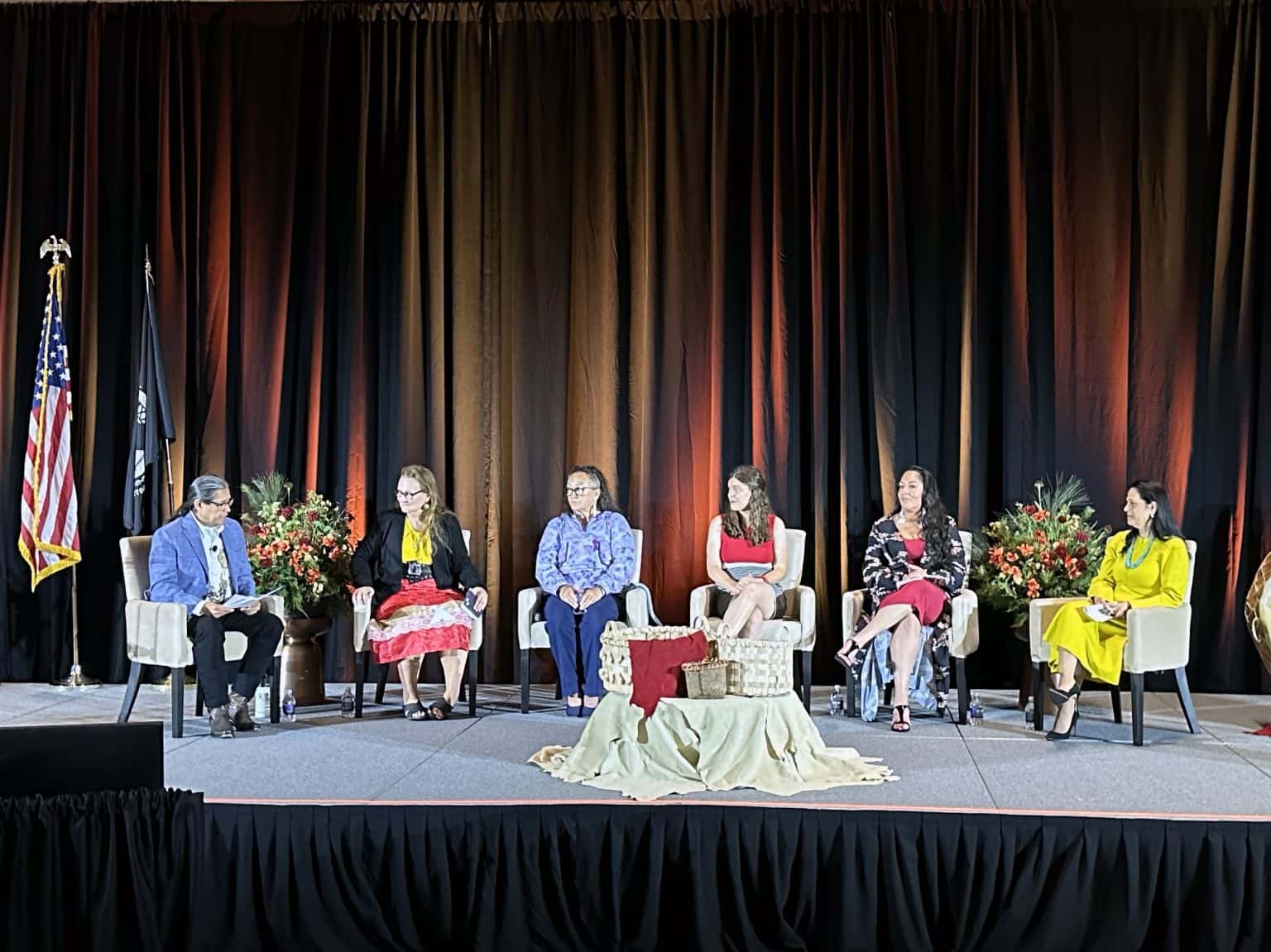Urgent call to action against violence on Native women: Even when it seems there is no hope, keep fighting
"Our people are worth it": NCAI panel confronts epidemic of violence, long road ahead and need for unity

From the left: Mark Macarro, Carmen O’Leary, Tami Jerue, Mary Kathryn Nagel, Abigail Echo-Hawk, Shannon Holsey
During a panel on the Violence Against Women Act at the National Congress of American Indians on Monday, at the Foxwoods Resort Casino in Mashantucket, Connecticut, leaders and survivors shared haunting statistics and personal testimonies, asking for systemic change and accountability, while rallying their communities to do more.
“The system was not designed to save our relatives, it was designed to eradicate us,” said Mary Kathryn Nagle, general counsel for the National Indigenous Women’s Resource Center.
When the question arose as to where to find the strength to fight for justice, when it feels hopeless, Nagle said, “There is every reason in the world to say, ‘I just don’t think I can do it. It’s so hard.’” She highlighted the jurisdictional gaps that allow perpetrators to escape justice, or how local law enforcement agencies often refuse to work with tribes or prosecute cases involving American Indian victims. The result is that “the perpetrators are free,” she said. Yet, “we can all work together as we move forward.”
The panel spoke about the staggering rates of violence faced by Native women, which is double the rate of other demographics. In some communities Native women are murdered at a rate ten times that of the national average. Even with no hope of justice, said Carmen O’Leary, director of the Native Women’s Society of the Great Plains, “We must continue to create pathways for people to become informed” and strengthen the sovereignty of Indian Nations to keep people safe.
Tami Jerue, executive director of the Alaska Native Women’s Resource Center, emphasized the connection between tribal land and jurisdiction. For survivors living in constant fear, she said, reauthorization of the Violence Against Women Act (VAWA) and the resources it provides is a lifeline. “When you are living day-to-day with the fear of violence in your life, you are looking at something to grasp, something to hold,” Jerue said. “This is not a family matter, this is a people matter. And because of that we all have the responsibility.”
The discussion turned deeply personal when Abigail Echo-Hawk, executive vice president of the Seattle Indian Health Board, shared her own story of survival. “As a survivor, I was raped for the first time when I was 6 years old, and it was not the last time,” she said, insisting on the importance of data to bring to the surface the reality of a hidden crisis.
Echo-Hawk spoke of the difficult, uncomfortable conversations needed within communities, even if rapists are in positions of power, as in her case. She spoke of intergenerational trauma, noting her attacker was a boarding school survivor who had experienced similar violence. Yet, she focused on the path forward through “restorative healing.”
“If I can heal for the generations of the future, I can heal for the generations of the past,” she declared. “We need to fight for it, and our people are worth it.”
Shannon Holsey, president of the Stockbridge-Munsee Band of Mohican Indians, reiterated the call for collective responsibility. “This is an everybody issue, and we all have a role to play,” she said, referencing a recent Wisconsin Supreme Court justice election as an example of successful grassroots mobilization. She ended with a powerful call to action: “We will no longer accept the things we cannot change, we will change the things we cannot accept.”
Panelists:
- Shannon Holsey, President, Stockbridge-Munsee Band of Mohican Indians
- Carmen O’Leary, Director, Native Women’s Society of the Great Plains
- Tami Jerue, Executive Director, Alaska Native Women’s Resource Center
- Mary Kathryn Nagle, General Counsel, National Indigenous Women’s Resource Center
- Abigail Echo-Hawk, Executive Vice President, Seattle Indian Health Board; Director, Urban Indian Health Institute
- Mark Macarro, President, National Congress of American Indians, Pechanga Band of Indians
Pier Paolo Bozzano
Data Journalist | Product & Audience Growth Lead
Help us keep the fire burning, make a donation to Buffalo’s Fire
For everyone who cares about transparency in Native affairs: We exist to illuminate tribal government. Our work bridges the gap left by tribal-controlled media and non-Native, extractive journalism, providing the insights necessary for truly informed decision-making and a better quality of life. Because the consequences of restricted press freedom affect our communities every day, our trauma-informed reporting is rooted in a deep, firsthand expertise.
Every gift helps keep the fire burning. A monthly contribution makes the biggest impact. Cancel anytime.







